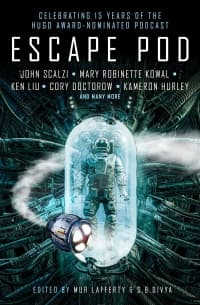
Escape Pod: The Science Fiction Anthology edited by Mur Lafferty & S.B. Divya
(Titan Books, 2020)
Reviewed by Ivy Roberts
Genre boundaries are blurred in this spinoff of the popular SF podcast. Editors Mur Lafferty and S.B. Divya compile 15 stories consisting mostly of tried-and-true Escape Pod contributors. Escape Pod brings together short stories old and new in this science fiction anthology, featuring authors John Scalzi, N. K. Jemisin, Ken Liu, Cory Doctorow, and Kameron Hurley, many of whom have been with the podcast since its inception in 2005. A foreword by Serah Eley, founder of the Escape Pod podcast, provides helpful context and background to the project. Helpful editor’s introductions precede each entry, providing context to the contributor’s individual style.
The anthology’s main thread incorporates genre mixing. “A Consideration of Trees” imagines a displaced tribe of fairies in a wildlife refuge on an orbiting space station. “Princess of Nigh- Space” blends horror, science fiction and fantasy genres. In it, Tim Pratt lands the titular Tasmin as an interdimensional refuge in our world, whose family lives in exile from an advanced, magical civilization that lies just behind a basement door. Indeed, fantasy, adventure, mystery, and drama populate the pages of this anthology. “Tiger Lawyer,” for example, depicts a courtroom drama populated by extraterrestrials and powers of transfiguration. Some of these stories would read quite mundane, were it not for the science-fictional novums.
Many of these stories address YA audiences, which highlights the juvenile tone in other essays. “Jaiden’s Weaver” takes place on a pioneer planet where the 13-year-old protagonist begs her parents for the outer space equivalent of a horse. “Lions and Tigers and Girlfriends” takes the form of a high schooler’s diary, albeit one who averts a mutiny on an intergalactic voyage. In such company, even Doctorow’s “Clockwork Fagin” comes across as juvenile, bringing life to a Dickensian orphanage, steampunk style.Doctorow’s tale, reprinted from a 2011 steampunk anthology, was also featured in an Escape Pod episode of the same year. This is one of the anthology’s longer reads.
Several stories incorporate humour to such a degree that they eventually seem juvenile, fittng into this volume as additionally light-hearted entries. Scalzi’s contribution, a reprint of a 2002 story, brings out the lighter side of the anthology, with a premise of an on-the-street segment inquiring about encounters with alien species. In a similar vein, “Report of Doctor Hollowas” depicts an interrogation following an incident on a spaceship that commences with comedic effect.
Social justice is featured heavily in this anthology, strong enough to stand out amid its otherwise inconsistent tone. “City of Refuge” confronts the prison industrial complex, garbed thinly in a science-fictional mise en scene. “Spaceship October,” like many other contributions to this volume, probes issues of social inequality through the lens of an interstellar voyage. “Citizens of Elsewhere” takes on issues of feminism and women’s rights under the guise of a time travel adventure. Among the featured authors, Jemesin’s “Give Me Cornbread” concludes the anthology with a story about dragons, exploring the social ramifications of drone warfare.
Still others address sophisticated SF readers. Ken Liu’s “Advanced Reader’s Picture Book of Comparative Cognition”, reprinted from his Paper Menagerie collection (2016) is one of the more sophisticated reads. Liu imagines a story told by father to daughter about her mother, an astronaut, is hauntingly beautiful. Mur Lafferty’s “Fourth Nail” accompanies the volume, providing a telling introduction to the author-editor’s larger oeuvre. Lafferty’s story develops a wild future populated by clones and dramatic social inequality. “The Machine that Would Rewild
Humanity” also dives into hard SF, telling a story of a post-human world populated by AI who ponder the ethical connotations of re-introducing an already-annihilated human race into the environment.
This volume would be appropriate for aficionados of science fiction, especially those geared toward SFFA and YA voices. The variety of stories compiled here are good for casual readers eager to dip into inconsistent, blended genre universes.
Review from BSFA Review 14 - Download your copy here.
